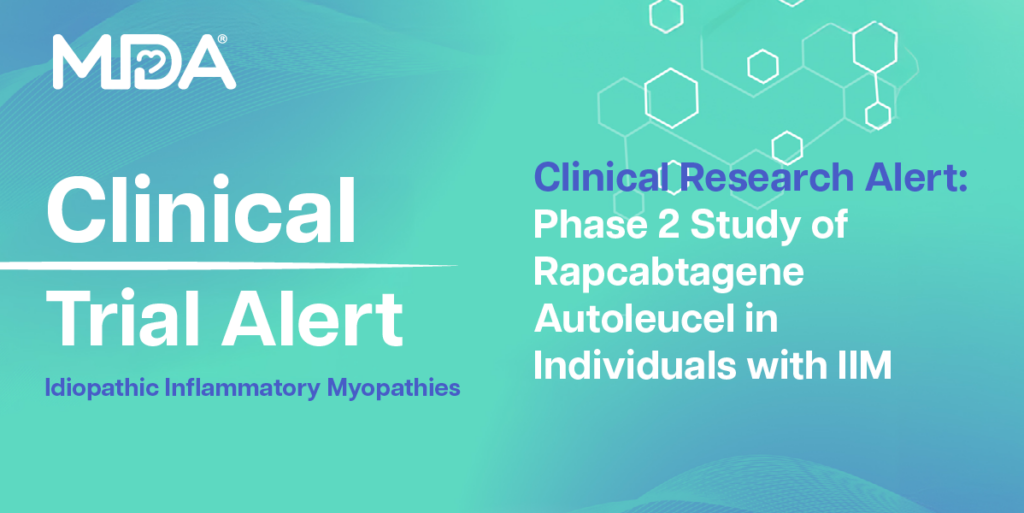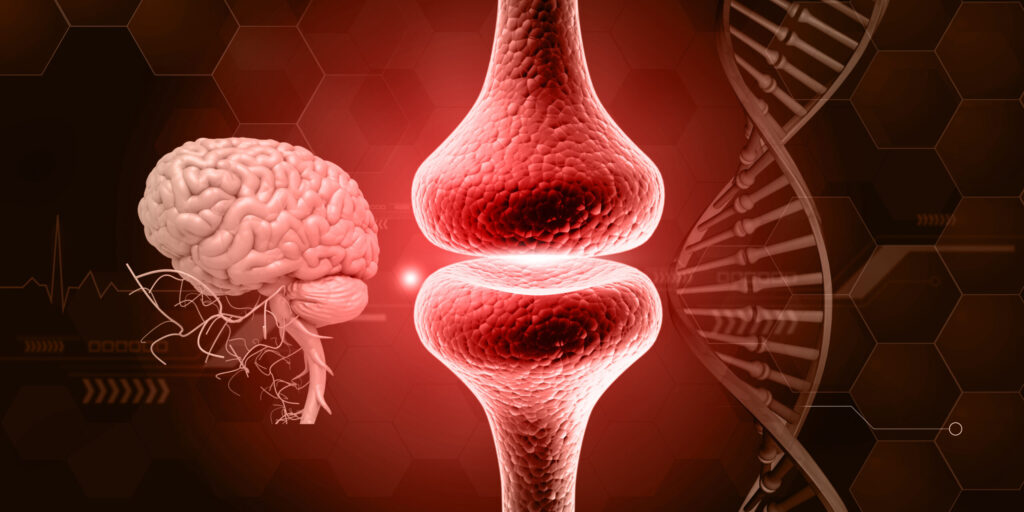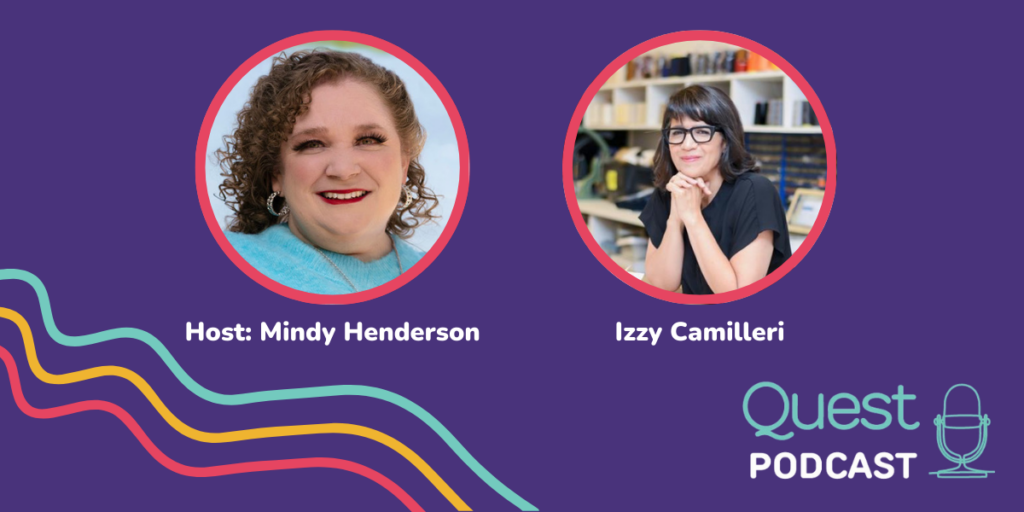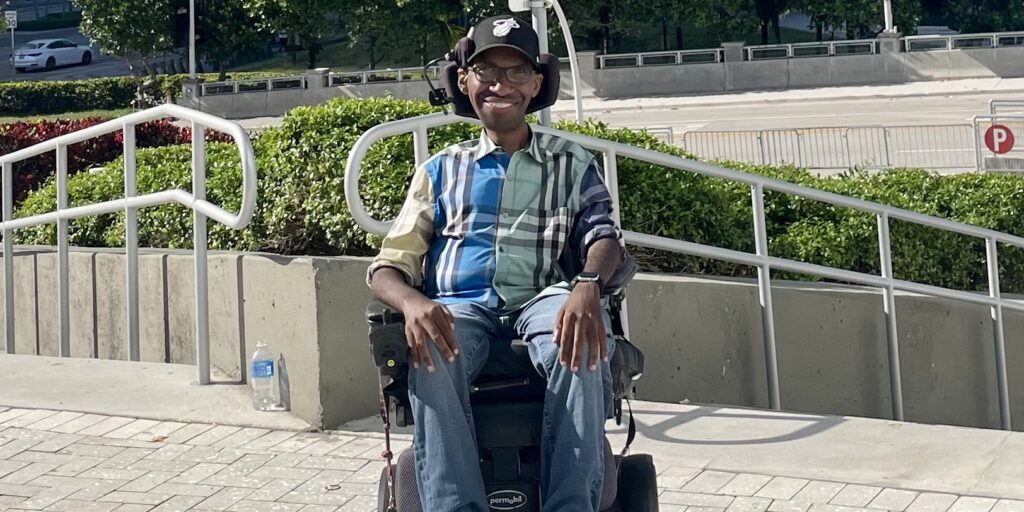
MDA National Ambassador Blog- Insights by Ira: Observations of Love with a Neuromuscular Condition
By Ira Walker | Thursday, August 22, 2024
5 Second Summary
MDA Ambassadors play an essential role in furthering MDA’s mission while representing and empowering the neuromuscular disease community. Quest Ambassador Guest Blog series provides a platform to share their personal stories, perspectives, and experience.
Do you like musicals? Personally, I adore musicals and find it to be one of the purest, most enjoyable medium of entertainment. My all-time favorite musical is Rogers and Hammerstein’s South Pacific. It’s an absolutely majestic musical and has a music number that always brightens my day: Happy Talk. An excerpt from the music number Happy Talk goes:
Happy talk,
Keep talkin’ happy talk,
Talk about things you’d like to do.
You gotta have a dream;
If you don’t have a dream,
How you gonna have a dream come true?
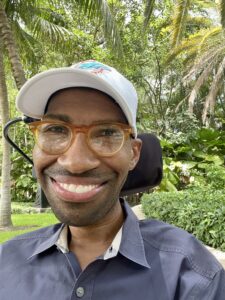
Ira Walker
At a very young age, I developed a dream that I would one day meet a good-hearted woman, fall in love, and raise a family with that person together. Having been raised in a home during my adolescence that was filled with the love and warmth that my parents showed to my siblings and to each other, I knew early on in life that this was truly the path I hoped for my own life. I wanted a blossoming marriage, an evolving family, and the happiness, challenges, and variety that comes with it. I’ve always seen my neuromuscular disease as a significant blessing in my life. It’s a blessing that allows me to demonstrate courage and tenacity, and to creatively discover ways not only to overcome challenges that come my way, but also to thrive and be an encouragement to others. Being fully aware of my condition and plight, I realized in those earlier years of my life that my journey to the dream of having a life of marriage and a family of my own would be different than that of my parents; a journey that is very different than the romantic journeys of most people that I knew.
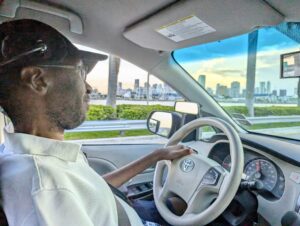
Ira safely navigating the highway
In late adolescence, I discovered that many areas of my life would come at a different timetable than my peers. I accepted that, because of my unique condition and its complexities, my ambitions and pursuits would come into view at more of a glacial pace. Where driving an automobile would be a matter that most of my peers achieved in their mid-teens, it was an ability that I gained in my twenties. Where living independent of one’s parental support was something that most of my peers achieved in their 20’s, this was a dream that became a reality for me in my early 30’s. Where having a stable and successful career was an ambition that was gained by most of my peers in their mid to late 20’s, I saw the realization of this dream come into focus in my 30’s. And the greatest of these, the actualization of finding a life partner and being united with the commencement of a family is a beautiful matter that I saw come into focus for most of my peers in their 20’s and early 30’s. For me, my love story is still being written.
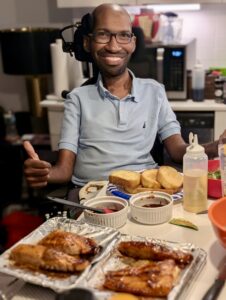
Ira showcasing his culinary capabilities
As mentioned earlier, I’ve accepted that many of my dreams and desires of the heart come at a longer cadence than my peers absent of a neuromuscular condition. This acceptance and patience has allowed me to focus my attention to developing into a man that can truly be a provider, a supporter, a guide, a partner, a friend, and a strong-minded person. I’m confident that the good-hearted woman, whom I’m meant to spend my life with, will love and cherish that life with me. This notion and philosophy has led me to evolve in ways that I likely wouldn’t have if I didn’t to see the blessing of my singleness.
During my adult life, being single has helped me to master the ability to efficiently care for myself at a high level. I’ve become confident and comfortable in independent long-distance driving. I’ve become a cultural connoisseur. I’ve developed great culinary abilities. I’ve gained an appreciation and joy for volunteering. I’ve grown to have an exquisite sense of style. But, most importantly, I’ve learned to love who I am and accept the blemishes that come along with being me. I truly believe that evolving a mindset of loving and fully accepting who you are is not only the key to living a life of happiness and contentment, but I truly believe it’s also a vital piece to being a wonderful partner.
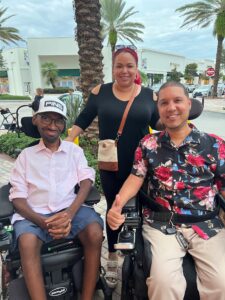
Ira with his friends Jose and his wife
The journey and pursuit of love can seem never-ending at times and is sometimes filled with frustration and worry. These thoughts and feelings can be present in the minds of those with or without a disability. I will admit to you that I’ve at times succumbed to the occasional notion of doubt that a woman could authentically and faithfully love me for who I am, seeing me as a man and seeing beyond the nature of my medical condition. During the journey, it can be tempting to conclude that the reality of matrimony and a family of one’s own is impossible. However, deep down in my heart and spirit I know that my life is destined to one day include an adoring marital companion and family. My remedy and solace to the intermittent uncertainty has been my investment in reflecting on the beautiful love stories of those with neuromuscular conditions and other disabilities that have successfully found love and created a family. I find encouragement and inspiration in the stories of other people living with disabilities who have been blessed to fall in love with partners who do not view disability as a burden or liability, but instead are able to see the full value, potential, and beauty that surpasses any unique condition. I could list a plethora of the pearls of wisdom that I’ve gained by witnessing and being in the presence of these loving couples, but the main take-away that I’ve come to appreciate the most is that there are genuinely sincere people that exist amongst us, and the depths of their heart are stronger and more powerful than any medical condition.
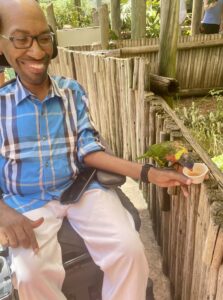
Ira feeding a bird
I took a moment through this forum to share the full desires and dreams of my heart in the same spirit and stance that I share any facet of my life. I shared my story in the hope that it could help to encourage and motivate others with a neuromuscular disease or other disability to know that is not only okay, but it’s good and healthy to have ambitions of love in our lives. To know that you are capable and worthy to of finding and having a loving relationship of another person. I believe it’s important to know that there are some matters in life that can be outside of one’s control, but one thing you can control is the decision to continually grow and evolve to be the best version of you – and to be open and ready when you meet that special someone.
Next Steps and Useful Resources
- Learn more about Spinal Muscular Atrophy (SMA) here.
- To learn more about MDA’s Mental Health Hub, visit here.
- MDA’s Resource Center provides support, guidance, and resources for patients and families. Contact the MDA Resource Center at 1-833-ASK-MDA1 or ResourceCenter@mdausa.org
- Stay up-to-date on Quest content! Subscribe to Quest Magazine and Newsletter.
Disclaimer: No content on this site should ever be used as a substitute for direct medical advice from your doctor or other qualified clinician.


